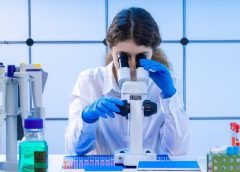Every type of scientific laboratory has different goals. The equipment you would find in a school’s chemistry lab will differ from the tools you would find in a professional laboratory. If you’re preparing your own laboratory setting, you may be collecting your own tools and instruments. Here are some pieces of essential equipment every biological laboratory needs to get started.
Laboratory Microscopes
A microscope is a staple piece of laboratory equipment. These instruments are crucial for observing biological subjects and their movement, reactions, changes, and more. The type of microscope that you’ll often find in a professional lab is a fluorescence microscope. A fluorescent microscope makes it possible to observe dyes and fluorescent proteins within cells at distinct levels.
Laboratory-Grade Glassware
Different types of glassware are also needed for any type of laboratory experiment. The most common types of glassware that biological scientists use are petri dishes, beakers, flasks, cylinders, test tubes, and more. These materials contain biological subjects while scientists perform experiments, mix substances, and observe reactions. Laboratory-grade glassware is resistant to chemical reactions, heat, and other conditions common in the laboratory setting.
Fluid-Handling Pumps
There are many diverse types of fluid-handling pumps you can find in biological laboratories. Fluid-handling tools range from basic pipettes to pneumatic injectors. Some common types of fluid-handling devices include microinjectors, syringe pumps, pneumatic injectors, and more. When starting your own laboratory, it’s important to choose the right pump based on your lab’s target subjects and experiments.
Centrifuge Machine
Centrifuge machines are a type of equipment that helps scientists separate a solution’s particles based on density. The machine works by rotating at rapid speeds, which helps expedite the separation process using the power of centripetal force. Centrifuge machines are common in biological labs for separating blood particles and platelets or purifying acids and other materials.
Now that you know these basic pieces of equipment every biological laboratory needs, you can start stocking your lab’s shelves and prepare to run your own experiments. Just don’t forget your other lab necessities, such as PPE and protective gear.


